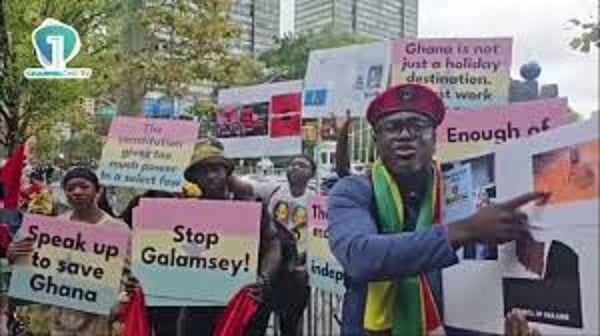The Attorney-General and Minister of Justice, Dr. Dominic Ayine, has brought an end to the legal proceedings against a group of individuals involved in the Democracy Hub protests by filing a nolle prosequi. This legal instrument effectively discontinues the prosecution of the accused, signaling the state’s decision to no longer pursue the case. Among those affected by this decision are prominent social activists Oliver Barker-Vormawor, Felicity Nelson, and social media influencer Elorm Ama Governor-Ababio, also known as Ama Governor. The list also included Michael Amofa, Nii Ayi, Frederick Boateng, deportee Iddrisu Yusif, Wendell Isaac Yeboah, Fanny Otoo, and Samuel Samakor. This action follows a period of intense public scrutiny and debate surrounding the arrests and charges brought against the protesters.
The Democracy Hub protests, spanning three days from September 21st to 23rd, saw the arrest of 53 individuals. The demonstrators, galvanized by the devastating impact of illegal mining, also known as galamsey, on Ghana’s environment and communities, took to the streets to demand stronger government action against this destructive practice. Their actions, which included road blockades, dismantling of police barriers, traffic obstruction, and property damage at Accra’s 37 Roundabout, resulted in their arrest and subsequent charges of unlawful assembly.
The government’s initial response to the protests was met with significant public backlash. Many Ghanaians, alongside various civil society organizations, voiced their concerns over the handling of the situation, arguing that the protesters’ actions, though disruptive, stemmed from legitimate concerns about a critical national issue. They called for the release of the arrested individuals, characterizing the charges as heavy-handed and a potential infringement on the right to peaceful protest. The decision to file the nolle prosequi appears to be a direct response to this mounting public pressure and the ongoing debate surrounding the proportionality of the government’s actions.
The galamsey crisis, the central issue driving the Democracy Hub protests, has had a profound and destructive impact on Ghana’s environment. Illegal mining operations have caused widespread deforestation, polluted water bodies with toxic chemicals like mercury, and degraded vast tracts of arable land. These activities not only threaten the livelihoods of communities dependent on these resources but also pose significant long-term risks to the country’s ecological health and sustainable development. The protesters argued that the government’s efforts to combat galamsey were inadequate and demanded more decisive action to address this urgent national crisis.
The protests, while focused on the immediate issue of illegal mining, also tapped into broader concerns regarding environmental governance and citizen participation in decision-making processes. The demonstrators’ actions reflected a growing frustration with what they perceived as a lack of responsiveness from the government to the concerns of ordinary citizens. Their demands extended beyond simply addressing galamsey to encompass a broader call for greater transparency and accountability in environmental policy and enforcement.
The Attorney-General’s decision to discontinue the case against the Democracy Hub protesters marks a significant turning point in this saga. While it brings relief to the individuals involved and addresses the calls for their release, it also underscores the power of public pressure and the importance of open dialogue in addressing complex national issues. The protests and their aftermath have ignited a crucial conversation about the galamsey crisis, its impact on Ghana’s environment and communities, and the government’s role in tackling this critical challenge. Moving forward, it remains to be seen how the government will respond to the underlying concerns raised by the protests and what concrete measures it will take to address the devastating consequences of illegal mining in Ghana.














